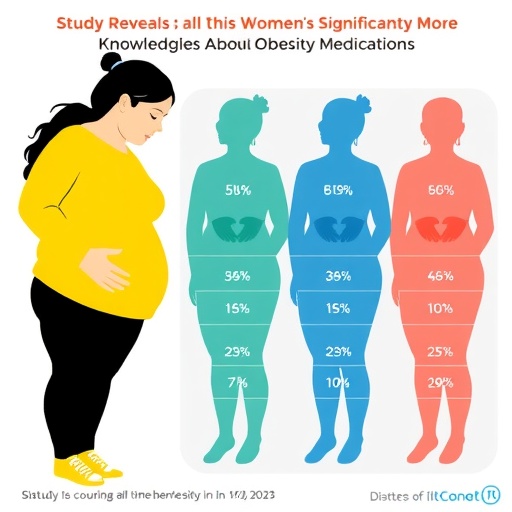
In an era where obesity remains a global health crisis, advances in pharmacotherapy offer new avenues for effective treatment. Recent research presented at the European Congress on Obesity (ECO 2025) in Malaga, Spain, unveils fascinating insights into public awareness and perceptions surrounding a novel class of obesity drugs known as GLP-1/GIP receptor agonists. These medications, including semaglutide and tirzepatide, have demonstrated remarkable efficacy in inducing substantial and sustained weight loss, reshaping therapeutic options for millions worldwide.
This cutting-edge study, conducted by researchers affiliated with Imperial College London and Voy, a digital health provider, sheds light on how adults in the UK perceive these drugs. The research leveraged a comprehensive electronic survey capturing attitudes, knowledge, and usage patterns related to GLP-1/GIP receptor agonists among 1,297 individuals. The demographic profile of participants revealed a median age of 44 years and an average body mass index (BMI) indicative of overweight status, underscoring the relevance of this investigation to populations most affected by obesity.
Crucially, the study demonstrates that awareness of GLP-1/GIP receptor agonists is widespread, with 80% of respondents acknowledging familiarity with these medications. However, this knowledge is not uniformly distributed: women exhibited significantly higher levels of awareness and understanding compared to men, suggesting varying channels of information dissemination and health literacy across genders. This gender disparity in comprehension signals the need for tailored educational strategies to ensure equitable access and informed decision-making.
Pharmacologically, GLP-1/GIP receptor agonists operate by mimicking incretin hormones that regulate glucose metabolism and appetite. By activating receptors for glucagon-like peptide-1 (GLP-1) and glucose-dependent insulinotropic polypeptide (GIP), these agents enhance insulin secretion, suppress appetite, and slow gastric emptying. The dual agonist tirzepatide, in particular, harnesses synergy between these pathways to produce superior glycemic control and weight reduction, positioning it at the forefront of obesity pharmacotherapy innovation.
Despite promising clinical trial data, public attitudes toward these drugs are nuanced. The research identified safety concerns, fear of side effects, and potential weight regain after discontinuation as major barriers preventing some individuals from initiating treatment. Around two-thirds of respondents highlighted these factors as pivotal in their decision-making process. Such apprehensions underscore the critical importance of transparent communication from healthcare providers and public health authorities to dispel myths and address legitimate worries.
Interestingly, those with experience using GLP-1/GIP receptor agonists expressed notably positive perceptions. Users were approximately seven times more likely than non-users to reject skeptical statements regarding the drugs’ safety and efficacy. This contrast between firsthand experiences and external perceptions illustrates a common theme in medical adoption: direct exposure often yields greater confidence and advocacy, which can be leveraged to enhance wider acceptance.
The implications of this study extend beyond individual patient choices to inform healthcare policy and implementation strategies. As the UK National Health Service prepares for a national rollout of tirzepatide, understanding public attitudes can help tailor outreach efforts, ensuring that vulnerable populations receive appropriate education and support. Equitable access remains paramount to prevent widening health disparities, especially given obesity’s disproportionate impact on socioeconomically disadvantaged groups.
Moreover, the research highlights the pivotal role emerging digital health companies like Voy play in bridging information gaps. By harnessing technology to provide safe, timely access to medications, such platforms can revolutionize patient engagement and streamline treatment pathways. Their collaboration in this study reflects an evolving healthcare ecosystem increasingly reliant on innovative delivery models alongside traditional clinical frameworks.
The study’s findings also serve as a timely reminder of the influence media exerts on health knowledge. Many participants reported first learning about these medications via news outlets and social media channels. This reality places responsibility on journalists, clinicians, and policymakers to curb misinformation, amplify evidence-based messages, and bolster health literacy to empower informed choices among the population.
Given the complexity of obesity as a multifactorial disease, combining pharmacotherapy with supportive lifestyle interventions remains essential. As GLP-1/GIP receptor agonists become more prevalent, comprehensive patient education encompassing drug mechanisms, expected outcomes, and management of side effects will be fundamental to optimizing adherence and long-term success.
Overall, this investigation presents a nuanced portrait of public consciousness regarding transformative obesity treatments. High awareness coexists with residual skepticism, delineating a landscape ripe for strategic educational initiatives. Bridging this gap will require concerted efforts across healthcare, industry, and media sectors to ensure that these compelling therapeutic advances translate into meaningful, accessible benefits for those living with obesity worldwide.
As obesity rates continue to escalate globally, the emergence of GLP-1/GIP receptor agonists heralds a paradigm shift in treatment paradigms. By navigating the complex interplay of knowledge, attitudes, and behaviors revealed in this study, stakeholders can catalyze more informed, equitable, and effective responses to one of modern medicine’s most pressing challenges.
Subject of Research: Public awareness, attitudes, and usage of GLP-1/GIP receptor agonists for obesity treatment in UK adults.
Article Title: [Not explicitly provided]
News Publication Date: 17-Apr-2025
Web References: N/A
References: N/A
Image Credits: N/A
Keywords: obesity, GLP-1 receptor agonists, GIP receptor agonists, semaglutide, tirzepatide, weight loss, pharmacotherapy, public awareness, health literacy, digital health, obesity treatment, patient attitudes
Tags: digital health and obesitygender differences in health awarenessGLP-1 receptor agonists knowledgeImperial College London research studyobesity crisis and treatmentsobesity medications awarenessobesity treatment advancementspharmacotherapy for obesitypublic perceptions of obesity drugssemaglutide and tirzepatide efficacysurvey on obesity medication usageUK adult health perceptions





